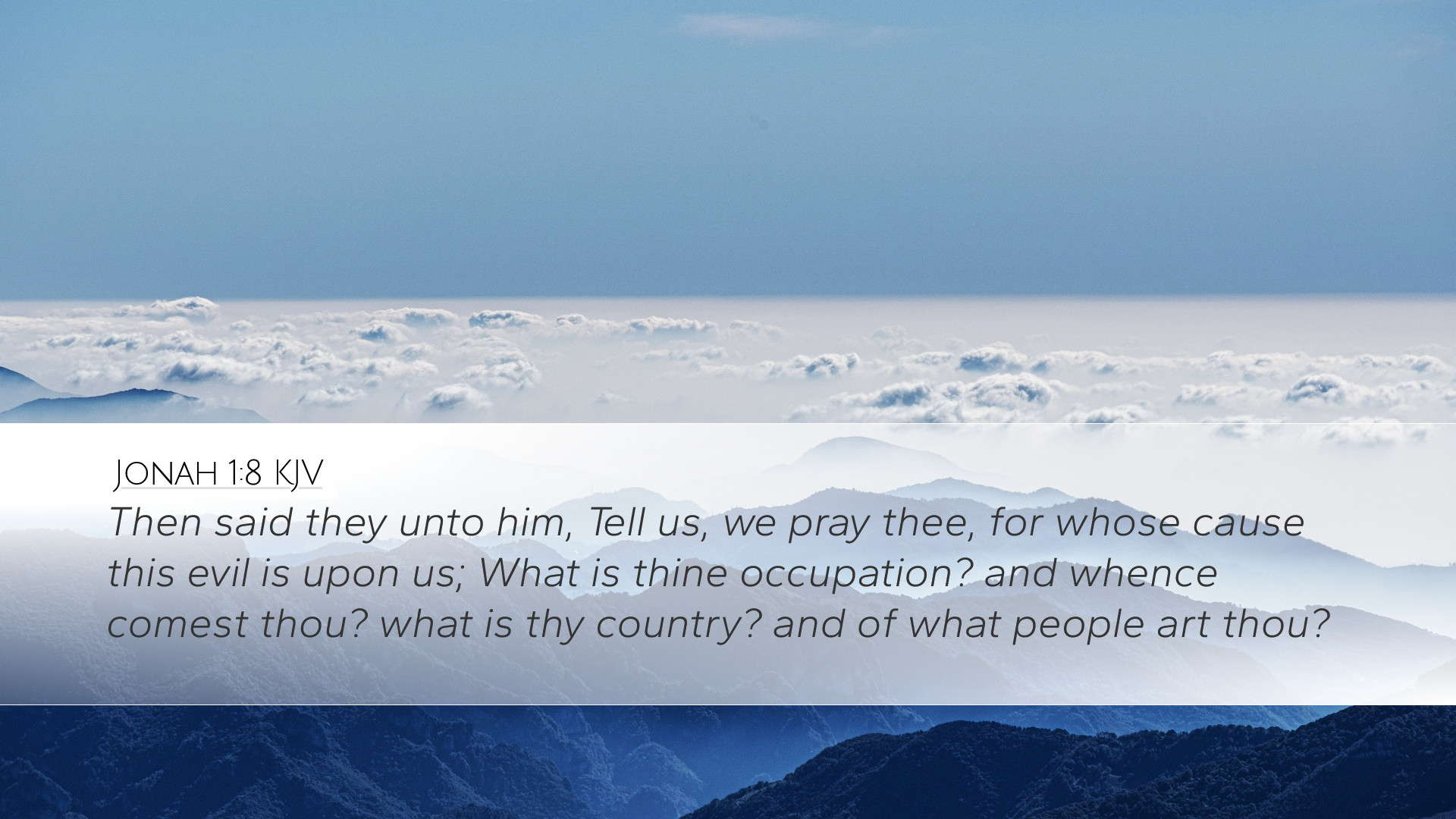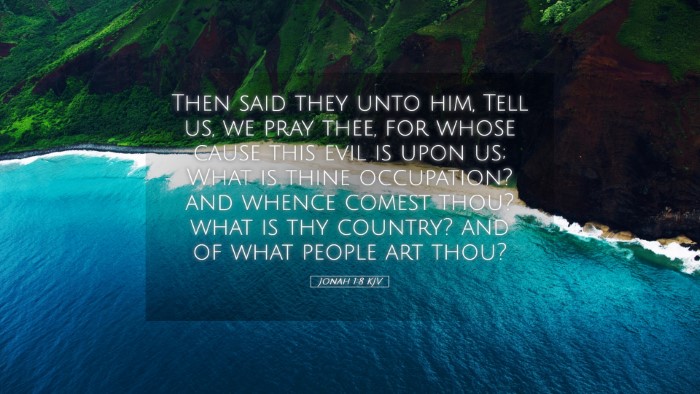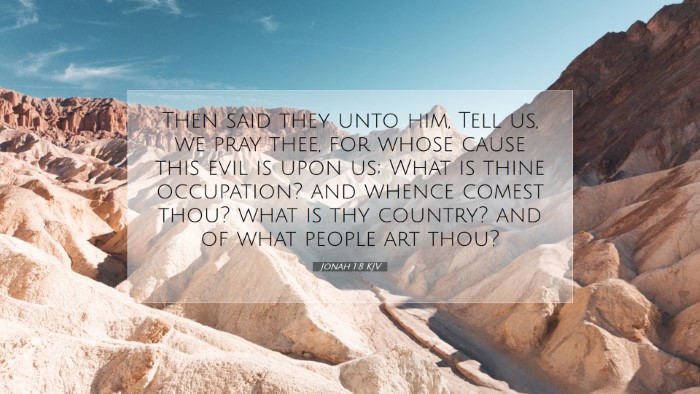Old Testament
Genesis Exodus Leviticus Numbers Deuteronomy Joshua Judges Ruth 1 Samuel 2 Samuel 1 Kings 2 Kings 1 Chronicles 2 Chronicles Ezra Nehemiah Esther Job Psalms Proverbs Ecclesiastes Song of Solomon Isaiah Jeremiah Lamentations Ezekiel Daniel Hosea Joel Amos Obadiah Jonah Micah Nahum Habakkuk Zephaniah Haggai Zechariah MalachiJonah 1:8
Jonah 1:8 KJV
Then said they unto him, Tell us, we pray thee, for whose cause this evil is upon us; What is thine occupation? and whence comest thou? what is thy country? and of what people art thou?
Jonah 1:8 Bible Commentary
Commentary on Jonah 1:8
Introduction
Jonah 1:8 presents a pivotal moment in the narrative of Jonah's flight from God's command. In this verse, the sailors confront Jonah, seeking to understand the cause of the storm that has besieged them. This encounter not only highlights Jonah's disobedience but also reveals the providential care of God, who uses even reluctant prophets to accomplish His purposes. The insights gleaned from the public domain commentaries of Matthew Henry, Albert Barnes, and Adam Clarke provide a rich understanding of this significant passage.
Context of Jonah 1:8
The Book of Jonah is unique among the prophetic writings in its narrative style, focusing on the experiences of the prophet rather than delivering a collection of prophetic messages. By the time we reach Jonah 1:8, Jonah has already chosen to flee from God's call to preach to Nineveh, demonstrating an unwillingness that sets the stage for divine intervention.
Henry notes that Jonah’s attempt to escape is reflective of a larger theme of disobedience, which runs through the Scriptures, showcasing the continual struggle of God's people to align with His will.
Verse Analysis
Jonah 1:8 (KJV): "Then said they unto him, Tell us, we pray thee, for whose cause this evil is upon us; What is thine occupation? and whence comest thou? what is thy country? and of what people art thou?"
- Inquiry of the Sailors: The sailors, faced with a life-threatening storm, turn to Jonah for answers. Clarke emphasizes their desperate inquiry, highlighting their ignorance of Jonah's background while noting their intuitive understanding that the storm must be linked to a divine cause.
- The Concept of 'Evil': The sailors' use of the word 'evil' refers not simply to moral wickedness but to calamity or disaster. Barnes elaborates on the idea that they are recognizing the storm as a manifestation of divine displeasure, which they cannot comprehend fully but are intuitively aware of.
- Occupational Questions: The sailors' questions about Jonah's occupation and identity serve to expose Jonah’s dual identity as both a prophet of God and a fugitive from His command. Henry emphasizes that this confrontation forces Jonah to confront the reality of his rebellion against God.
Theological Implications
This verse invites readers to ponder the nature of divine sovereignty and human responsibility. The sailors’ questions ultimately lead to a deeper spiritual truth about who God is and His pursuit of those who stray from His path.
- God's Sovereignty: Jonah's flight does not thwart God's plans, as evidenced by the circumstances that drive the sailors to seek Jonah's intervention. According to Clarke, this demonstrates that divine purposes will prevail regardless of human rebellion.
- Human Inquiry: The sailors’ questioning reflects humanity's innate desire to understand suffering and calamity. It raises the important theological concept of why affliction often leads to existential questioning about identity and purpose.
- Relationship Between God and Creation: The sailors, through their questions directed at Jonah, unknowingly engage in a dialogue that illustrates the relationship between God and His creation, establishing a precedent for recognizing divine action in times of trouble. Barnes notes that this moment might lead to their eventual conversion.
Lessons for Believers
Reflecting on Jonah 1:8, several lessons emerge for contemporary believers:
- The Consequences of Disobedience: Jonah’s struggle and the storm's fury serve as a poignant reminder of the repercussions of fleeing from divine calling. Henry suggests that believers should consider the ramifications of their actions on themselves and those around them.
- Seeking God in Crisis: Just as the sailors turn to Jonah in desperation, we are encouraged to seek God in our own storms. Barnes underscores the importance of prayer and seeking divine intervention in difficult circumstances.
- Testimony of Faithfulness: The encounter emphasizes the power of testimony in discerning one’s place in God’s plan. Jonah ultimately becomes a reluctant witness to God’s sovereignty, which can encourage believers to share their own experiences of God's work in their lives.
Conclusion
Jonah 1:8 encapsulates a complex interaction filled with existential questions, theological implications, and moral lessons. The convergence of the sailors’ inquiry with Jonah’s rebellion illustrates the intricate interplay of human choices and divine purposes. As believers engage with this text, they are reminded of the undeniable reality that God is actively working through the chaos of life, calling His people to acknowledge Him even amidst rebellion.


